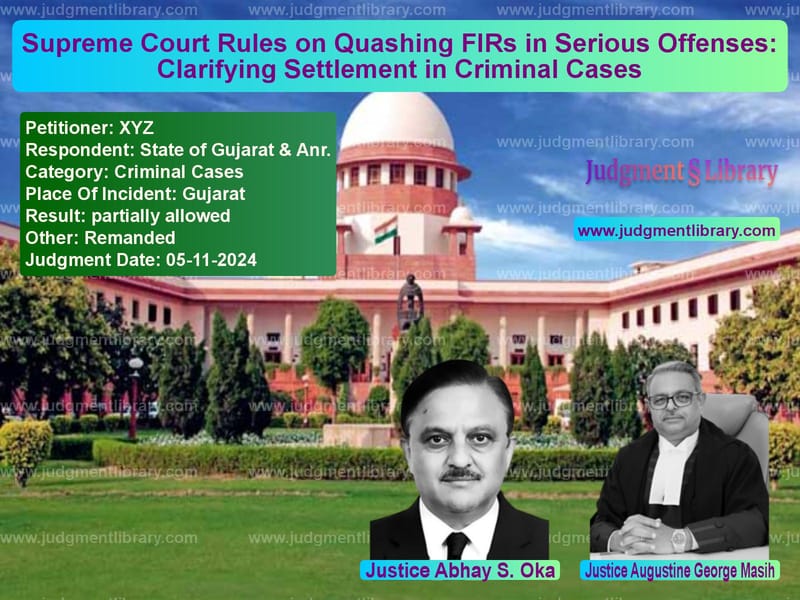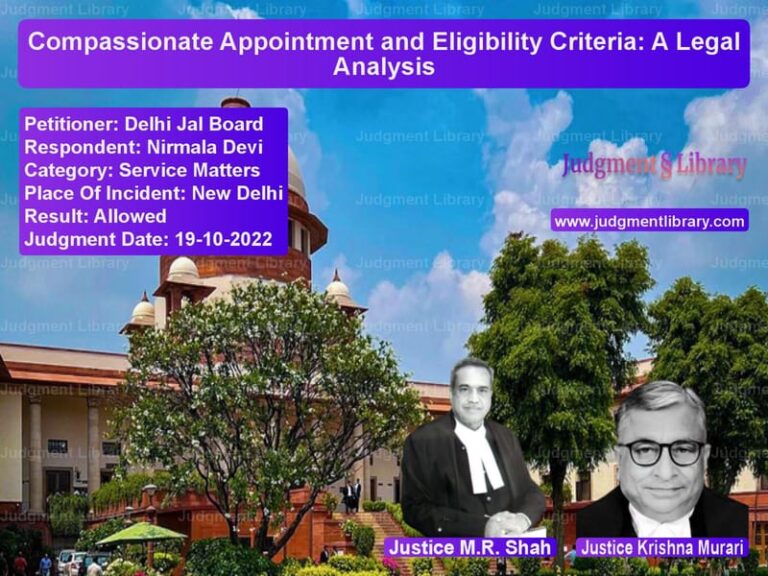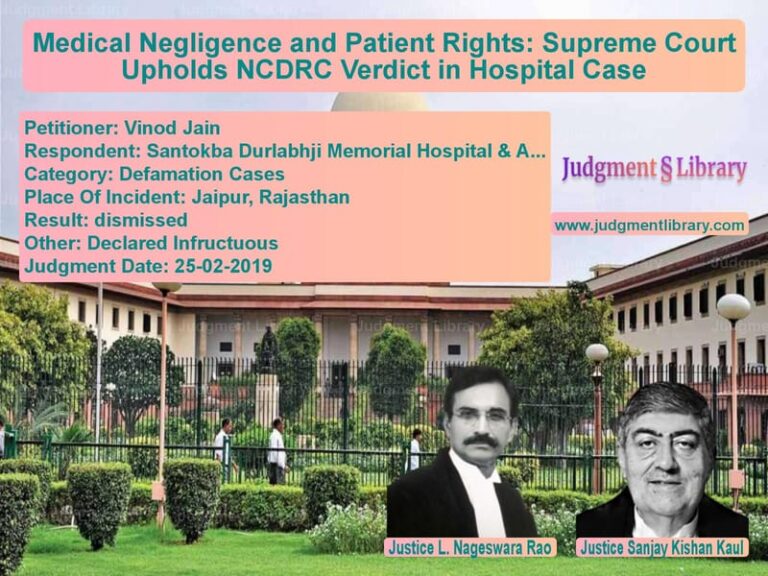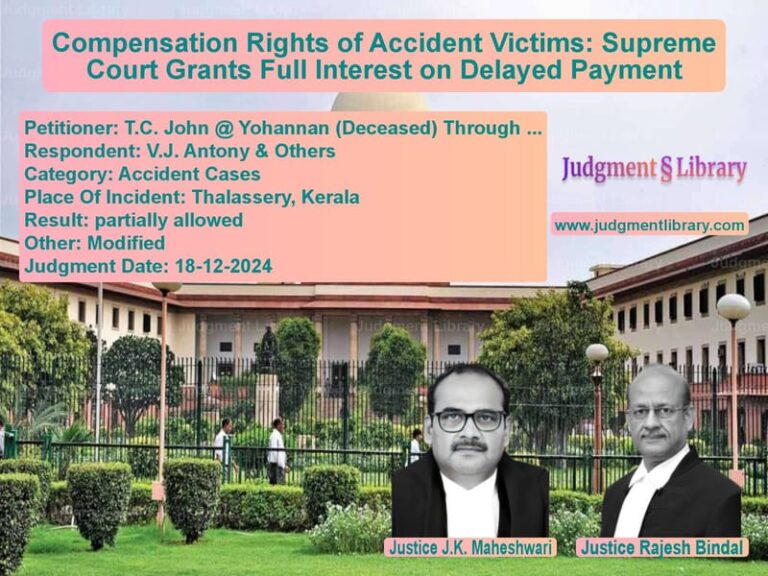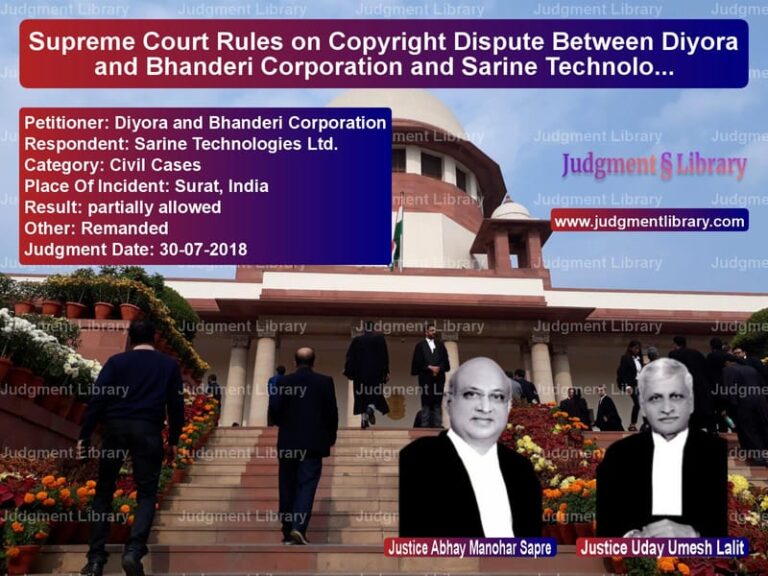Supreme Court Rules on Quashing FIRs in Serious Offenses: Clarifying Settlement in Criminal Cases
The Supreme Court of India recently delivered a crucial judgment in the case of XYZ vs. State of Gujarat & Anr., addressing whether an FIR for a serious criminal offense can be quashed based on an alleged settlement between the accused and the victim. The Court examined the procedural fairness in recording settlements and quashing criminal proceedings under Article 226 of the Constitution and Section 482 of the Code of Criminal Procedure (CrPC).
Background of the Case
The appellant in this case was the complainant, who had filed a First Information Report (FIR) against the accused under:
- Section 376(2)(N) and 506 of the Indian Penal Code (IPC) – related to repeated sexual assault and criminal intimidation.
- Section 3(1)(R), 3(1)(w), and 3(2)(5) of the Scheduled Castes and Scheduled Tribes (Prevention of Atrocities) Act, 1989 – addressing offenses against a member of the SC/ST community.
Subsequently, the accused filed a petition before the Gujarat High Court seeking to quash the charge sheet, claiming that a settlement had been reached with the complainant. The High Court granted the plea, quashing the proceedings and directing the complainant to refund the compensation received under the Atrocities Act.
Key Legal Issues Raised
- Whether the Gujarat High Court was justified in quashing an FIR for a serious non-compoundable offense based on a settlement.
- Whether the settlement affidavits presented before the High Court were valid and voluntary.
- Whether the complainant’s absence in court at the time of recording the settlement affected its legitimacy.
Petitioner’s Arguments
- The appellant argued that the High Court quashed the FIR without verifying whether the settlement was genuine.
- It was contended that the complainant was not personally present before the High Court, and her affidavits were submitted without her knowledge.
- The affidavits were allegedly suspicious since one was in English and executed in Ahmedabad, while the other was in Gujarati and executed in Rajkot, both on the same date.
- The complainant was illiterate and had merely put thumb impressions on the affidavits without being informed of their contents.
- The complainant’s advocate in the High Court had not submitted any authorization or vakalatnama from her, raising further doubts about the authenticity of the settlement.
Respondent’s Arguments
- The accused contended that the affidavits had been executed voluntarily by the complainant.
- The settlement had been reached in the presence of the complainant’s brother, who countersigned the documents.
- Copies of the complainant’s Aadhar card were annexed to the affidavits, proving her identity.
- A letter dated November 11, 2023, written by the complainant to the police station, acknowledged receiving a settlement amount of ₹3,00,000.
- The complainant was also allegedly present in the Gujarat High Court during a prior bail hearing, indicating her willingness to settle.
Supreme Court’s Analysis
1. Court’s Duty to Verify Settlement in Serious Cases
The Supreme Court emphasized that when dealing with petitions for quashing criminal proceedings in serious non-compoundable offenses, courts must independently verify if the settlement is genuine. It stated:
“When a petition is filed for quashing criminal proceedings of non-compoundable offenses, especially those involving sexual violence and the SC/ST Act, the court must ensure that the settlement is voluntary and not coerced.”
2. Role of the Complainant in Court Proceedings
The Court held that the High Court erred in accepting the settlement without securing the complainant’s personal presence. It observed:
“In cases involving serious offenses, the presence of the victim before the court is necessary to ascertain that the settlement is genuine and voluntary.”
3. Lack of Endorsement on Affidavits
The Supreme Court noted that the affidavits did not contain an endorsement stating that their contents had been explained to the complainant. Given her illiteracy, the Court ruled:
“The absence of an endorsement confirming that the contents were explained to the complainant raises serious doubts about the validity of the settlement.”
4. Whether the Settlement Justifies Quashing the FIR
The Court ruled that even if a settlement had been reached, the offenses involved—rape and caste-based atrocities—were grave and affected public interest. It stated:
“Even assuming there was a settlement, the High Court ought not to have quashed the charge sheet considering the gruesome nature of the offense, which is against society.”
Final Judgment
- The Supreme Court set aside the Gujarat High Court’s order quashing the FIR.
- The case was remanded back to the Gujarat High Court for fresh consideration.
- The complainant was directed to be personally present before the High Court to clarify her stance.
- The High Court was given the authority to order an inquiry into whether the affidavits had been signed voluntarily.
- If the High Court found that a genuine settlement had been reached, it was required to determine whether the case could still be quashed in the interest of justice.
Implications of the Judgment
- Stricter Scrutiny in Quashing FIRs: Courts must ensure that settlements in serious cases are not coerced or fraudulent.
- Importance of Personal Verification: Victims should be required to appear in court before their statements are accepted.
- Limits on Quashing Rape and Atrocity Cases: The judgment reinforces that offenses affecting public interest cannot be casually quashed.
- Judicial Oversight in Settlements: Courts can conduct inquiries to verify whether settlements in criminal cases are voluntary.
This judgment strengthens legal protections for victims of serious crimes and sets a precedent for careful judicial scrutiny in cases where accused persons seek to quash FIRs based on alleged settlements.
Petitioner Name: XYZ.Respondent Name: State of Gujarat & Anr..Judgment By: Justice Abhay S. Oka, Justice Augustine George Masih.Place Of Incident: Gujarat.Judgment Date: 05-11-2024.
Don’t miss out on the full details! Download the complete judgment in PDF format below and gain valuable insights instantly!
Download Judgment: xyz-vs-state-of-gujarat-&-a-supreme-court-of-india-judgment-dated-05-11-2024.pdf
Directly Download Judgment: Directly download this Judgment
See all petitions in Bail and Anticipatory Bail
See all petitions in SC/ST Act Case
See all petitions in Judgment by Abhay S. Oka
See all petitions in Judgment by Augustine George Masih
See all petitions in partially allowed
See all petitions in Remanded
See all petitions in supreme court of India judgments November 2024
See all petitions in 2024 judgments
See all posts in Criminal Cases Category
See all allowed petitions in Criminal Cases Category
See all Dismissed petitions in Criminal Cases Category
See all partially allowed petitions in Criminal Cases Category

